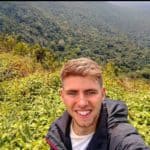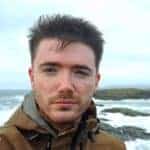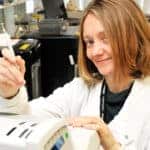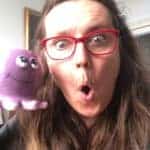-
Asked by anon-372191 on 21 Nov 2023. This question was also asked by anon-372181.
-
Cristina Steliana Mihailovici answered on 21 Nov 2023:
I think around 2, 3 years old, as soon I was able to explore the beach and the sea.
-
-
Tanya Riley answered on 21 Nov 2023:
I think I have always liked the oceans and finding things out. I was 7years old when I decided that I wanted to be a marine biologist
-
Jake Norton answered on 21 Nov 2023:
When I was younger I always enjoyed science at school, but I never thought of it as a career until I was maybe 22 years old. Don’t feel the pressure to choose a career whilst at school!
-
A Non answered on 21 Nov 2023:
Watching natural history programmes, likely when I was about 6/7 years old. And when we started to use Bunsen burners at senior school, I found that very exciting.
-
James Bron answered on 21 Nov 2023:
Less than 5 years old but by 5 in knew I wanted to be a marine biologist
-
Ambre Chapuis answered on 21 Nov 2023:
Very very early, I don’t remember for sure what age but around 6 years old I recall getting a microscope (kid’s one) for my birthday, and I was obsessed with watching everything that I could find through it.
-
Karen Edwards answered on 21 Nov 2023:
I always liked maths and science in school but was really put off by my High School biology class where we just sat and copied notes that our teacher wrote onto her overhead projector. I did Math and Computer Science (programming) for my undergraduate degree and didn’t pursue science as a career until I made a big change in my 30s and went back to school to get a PhD in Oceanography.
-
Anton Edwards answered on 21 Nov 2023:
I became interested when I was about 10 and loved to read about the solar system and its planets. I found it easy to remember nerdy things like how far they were from the sun, their sizes and what was known about them. At that age, science was mixed up with imagination about space travel and life on Mars. As I got a little bit older I realised that I could do “maths” and that it was not just boring arithmetic. And where I lived was full of industrial things like blast furnaces, coal mines, gas ovens, glass works, trains, engineering, chemical works, so science seemed very real and relevant.
-
Anuschka Miller answered on 21 Nov 2023:
I was about 20 when I first thought about becoming a scientist. Until then I had enjoyed nature and quite liked science, but not massively. I was more into books, languages, art, politics culture and philosophy. It was when I became a committed environmentalist that science became more interesting to me. Only then did I understand it wasn’t about knowing answers but about asking questions and finding out stuff. I don’t think I understood what science is until then.
-
Clemence Fraslin answered on 21 Nov 2023:
Probably around 6/7 year old, maybe before but I don’t remember well. I loved learning about science and life in school and discovered I was good at it. My dad was a plant scientist and he would bring me to his work sometimes, at the time I found it super boring but looking back I think it helped me develop my interest for science
-
Arlene Ditchfield answered on 21 Nov 2023:
I have always loved the sea from an early age and was curious about the creatures in rock pools (about age 8). This love for the sea and science in general was fueled further when I started to learn about science in school and university. I have always liked to ask why and understand how things work. How about you?
-
Jenny Shepperson answered on 22 Nov 2023:
When I was younger I don’t think I really realised I was interested in science.. after school I applied for medicine at Uni, because I wanted to look after people, but I didn’t get in (probably because I was thinking about being a doctor more as a way to care for people, rather than as a science and figuring out what was wrong with people). I took a gap year, did some travelling, and realised I wanted a job that allowed me to keep travelling, so I studied Ecology (animals, and how they interact with the environment around them). I don’t think I really was properly interested in science until I spent a year living and working in a rainforest in Borneo during my degree – that’s when I realised science could be so cool, and could be such an exciting career.
-
Mimi Asogwa answered on 23 Nov 2023:
When I was in Senior Secondary school aged 14 years , I loved Biology especially the practical session and I believe that sparked an interest in Science for me.
-
Clare Johnson answered on 23 Nov 2023:
I think from primary school when we did simple experiments like putting a candle under a jar and watching it go out. I also enjoyed science and the experiments in secondary school.
-
Amina Moss answered on 28 Nov 2023:
I was curious from I can remember, always asking questions that others were afraid to ask. The first gift that I remember wanting was a microscope. As such, I grew up watching documentaries, being curious and I just knew that biology was the right thing for me. I just was not sure what sort of biology would be best, until I realized my love for the marine life, and it was love, ever since!
-
Camilla Cassidy answered on 30 Nov 2023:
I’ve been curious about science for as long as I remember, but certain teachers and TV shows helped. I think we’re always learning, so I like that science is how we learn about the world and why and how, through testing and sharing.
Related Questions
what life lessons have you learned whilst working there?
how long have you been doing this
when did you get into oceangraphy
Dear Amina, I want to be a marine biologist and work with dolphins to learn how they live and survive. What should I
What goals do you wish to achieve as a scientist?
You are my favourite scientist and I would like to know how long have been a scientist?
What was your dream job when you were a kid
Latest Questions
-
If you had to write a story, what marine creatures would you include in it?
-
how do you manage pathogen transmission between farmed and native populations? is there a risk of introducing a
-
do you try to maintain genetic diversity in farmed populations?
-
Have you seen a shark in the wild and if so how do they react to humans in their habitat
-
What do you feel is the best thing you’ve learnt in science?
-
what challenges do u face when working? (1 Comment)
-
what life lessons have you learned whilst working there?
-
What is aquaculture?
-
How do you know where to find the Harbour Porpoises in the sea or ocean?
-
is it fun diving
Latest Comments
-
what challenges do u face when working? (1 comment)
-
You are my favourite scientist and I would like to know how long have been a scientist? (1 comment)
-
how long have you been doing this (3 comments)
-
What kind of experiments do you like to do in science class? (2 comments)
-
when did you get into oceangraphy (3 comments)






Comments